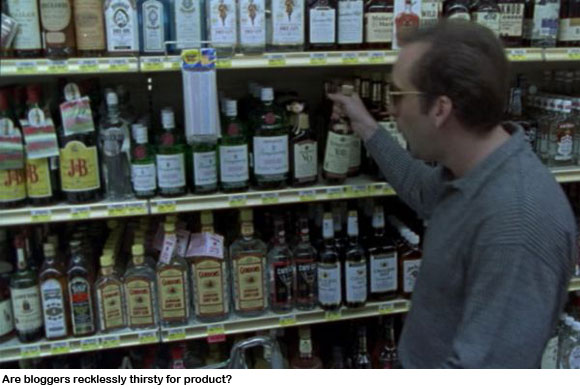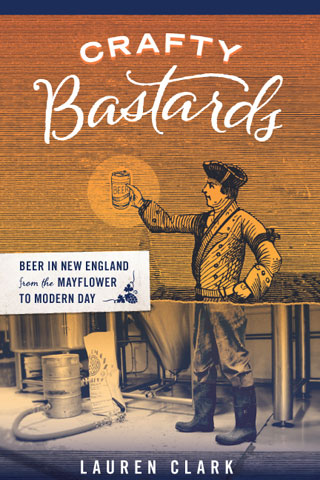October 16th, 2009
Does this mean we’re legit?

Bloggers have arrived. It’s true, because the Federal Trade Commission recently decided to impose rules on us. All together now: Wooo … hey, wait a minute!
Starting December 1, bloggers, and even users of Twitter and Facebook, “who review products must disclose any connection with advertisers, including, in most cases, the receipt of free products and whether or not they were paid in any way by advertisers, as occurs frequently,” reported the New York Times. “For bloggers who review products, this means that the days of an unimpeded flow of giveaways may be over. More broadly, the move suggests that the government is intent on bringing to bear on the Internet the same sorts of regulations that have governed other forms of media, like television or print.”
Hmmm, where to start. Disclosure? Well of course people should disclose when they’re compensated for endorsing stuff. But what is “compensation?” What is “endorsing?” Do I have to spell out that free booze is involved whenever I write about a promotional event hosted by a liquor company? Then there are product reviews. Those aren’t generally my game, but, given that this is a blog about drinking, I do discuss products from time to time — products I’ve paid for and products I haven’t. In this review of ri(1) whiskey, was it enough to disclose that I got a bottle of the stuff in the mail and let readers make the assumption? Or do I have to come right out and say that it was a gift, or, let’s cut to the chase, a bribe? Does the fact that I didn’t exactly endorse the whiskey count for anything? Or does merely devoting a post to it mean that I’m promoting it? Can you say can o’ worms?
The FTC ruling is aimed partly at celebrity bloggers who don’t disclose their ties to companies. Fair enough. But most bloggers aren’t celebrities, and I’m guessing most would laugh at the notion that they’re recipients of “an unimpeded flow of giveaways.” Certainly, there are bloggers out there who act as stealth spokesmen. I’ve been approached by some small companies — you know, people who make novelty coasters and stuff — asking if I’d write a positive review of their products in exchange for a little cash. Ewww. Like I’m going to whore myself out to these guys for $50. But some people do just that, or such solicitations wouldn’t exist. The thing is, it’s pretty easy to ID the bloggers who are only in it for free product — their blogs are boring, and no one reads them.
The other issue here is, are bloggers and the rest of the social media world being unfairly singled out? Some people think so. But … don’t the FTC’s rules about deceptive advertising practices apply to other forms of media? That’s why movie producers are always getting slapped with big fines for product placement in their films, and travel writers are punished for free hotel-room stays, and the beer newspaper I once wrote for was ordered to cease and desist the practice of taking free samples of IPA.
Right.
So why make a point of applying the rulebook to social media without renewing the commitment to crack down on pay-for-play in the traditional media? Because, as the Times article points out, “sites like Twitter and Facebook, as well as blogs, have offered companies new opportunities to pitch products with endorsements that carry a veneer of authenticity because they seem to be straight from the mouth — or keyboard — of an individual consumer.” In other words, it’s worse to be deceived by a close friend than by a stranger.
Very few social media mavens are losing sleep over any of this, of course. I mean, besides the fact that there are a couple hundred million of us for the FTC to monitor, we realize that the regulators are lagging adorably behind reality. Sure, a few people have no doubt been tricked into buying Nikes because some celeb got paid to blog about sneakers. But the online world evolves quickly, and, personally, I think its denizens are more savvy than they get credit for. Plus, if the feds came after me for not disclosing that those drinks I had at the Grand Marnier party were free, I’d gain such notoriety that I probably could get an endorsement deal. Hello, Beefeater?
Permalink | Filed under Booze in the news | Tags: advertising, bloggers, FTC, social media

October 17th, 2009 at 12:44 am
wait. hey gertsen…
did we forget to charge lauren for all those drinks at the grand ma party????
rats.
October 17th, 2009 at 10:32 am
This was heavily discussed on the CSOWG (cocktail & spirits online writers group) and the first reaction was a mixture of paranoia and disgust. The next wave included examples of blanket disclaimers people came up with (SpiritsReview being a good one and open sourced the wording to it). And the last wave was a clarification that they were not going to go after reviewers in general (if you believe what they say, that is), but only those that misrepresent the product.
Besides, I don’t review products. I just provide recipes of what I drank, right?
The worst part about it is that print publications are not governed by these particular laws. Perhaps it just means we’re legit but don’t have a political lobby to stop these laws from coming about.
October 17th, 2009 at 12:10 pm
The spirit of this thing makes sense to me: it’s aimed at the growing industry of selling favorable reviews while pretending to be unbiased. If you’re the blogger equivalent of The Phantom Gourmet, pretending to be a real reviewer while repeatedly servicing your advertisers and ignoring places that don’t pay the graft, you have to fess up, because there will be some in your audience naive enough to believe you’re not a whore. If you are whoring, you’ve got to hang out a sign to that effect.
Of course, the devil is in the implementation and enforcement. But I hope and expect that bloggers who write with integrity, who aren’t pimping themselves out in return for sponsorship or comped eats and drinks, should be just fine.
October 17th, 2009 at 4:05 pm
Another example of Big Government steadily increasing its presence into your life. Music writers have received free records/CDs for decades;film critics see movies at free screenings or get “screener” DVD’s in the mail (although thats being phased out due to torrent uploads). That’s just a couple of examples. An informed person accesses multiple reviews and realizes that there’s all sorts of chicanery behind much information that’s out there. Anyone who believes a celebrity blogger gets what they deserve. The industry will merely invent new ways of getting its product advertised and talked about — the government outlawed payola in the music biz in the 50’s, but it never stopped it; it just changed its M.O. Same thing will happen with this issue.
October 17th, 2009 at 7:06 pm
Thanks for weighing in, fellas. Your opinions run the gamut, which is always fun. As far as pure principle goes, I’m with Slim. But in real-life terms, I’m with Cleve. Like both Fred and Cleve point out, print publications do seem to be exempt from these rules — perhaps because the speech they’re expressing is perceived as somewhat controlled by editorial guidelines, etc., while the blogosphere is perceived (rightfully) as the wild west. But you gotta wonder — was the new ruling triggered by consumer complaints about being deceived by bloggers/stealth shills, or did the suits in the FTC suddenly get freaked out by the proliferation of online voices and conclude that deception in the blogosphere is somehow more dangerous than in the traditional media?
October 18th, 2009 at 12:00 am
Glad to see this being talked about. I think this is an issue that, as Frederic pointed out, could create tension/paranoia in a community at first, but it seems to me that ethical bloggers (who may well have disclosed their receipt of giveaways already) have nothing to worry about.
A tangential topic to look at might be the stance of the IRS… at what point do giveaways and gifts become non-monetary income?
October 21st, 2009 at 8:43 pm
“an unimpeded flow of giveaways” – hmm, yes, please. Remember a while back the mini-hoopla over these really awful movies that were being advertised with quotes from “reviews” just raving about the movie? Turns out they were paid reviewers as in paid by the movie people.
October 21st, 2009 at 8:50 pm
Ooh, yeah, good point, Patricia.
October 22nd, 2009 at 5:48 am
I dont really understand why you say “Can you say can o’ worms?”
What is wrong, or complicated, or unfair, with simply stating at the end, or anywhere visable, of the blog post or review that the person who wrote the article recieved a free sample by the producer/distributor and was asked to write a review/post?
Overall I agree in principle with the new regulations; blogs and other, lets say independent, web media are give off a sence of security to the consumer, and producers do take advantage of this fact.
From your artice I get the impression that although you cannot find any real flaw in the new regulations, you do feel the need to moan, groan and whine about them a bit, perhaps because you somehow feel that this will be the end of the freebies. Get a grip.
—
Pomidor